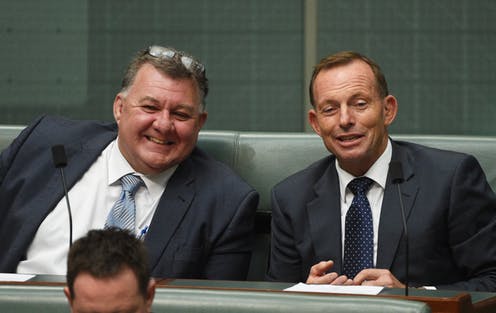The conservative wing of the Federal Coalition government is likely to entrench its hardline position on climate and energy policy, following the poor showing in the “Super Saturday” by-elections, making it even less likely that a compromise can be found on the National Energy Guarantee.
Along with the proposed company tax cuts, energy policy is also in the firing line, not a softening of hardline positions as one might hope, but possibly trying to out-do One Nation and propose new coal-fired generators in a bid to woo the far right.
That, at least, was the line being run by many in the Murdoch media on Monday, and then by Tony Abbott as the day drew on.
Abbott was a “rethink” on emissions targets, and not in a good way. And if that sounds completely looney, then only to those who have not been paying attention to energy policy over the last few years.
It is increasingly likely that a final decision on the NEG will be kicked down the road by the CoAG energy ministers, particularly given that the August 10 meeting is an artificial deadline imposed by the federal government.
But the Labor states are under intense pressure, and are themselves reluctant, to sign off on a policy that has a demonstrably woeful emissions reduction target, and may yet contain some booby-traps in the detail of the legislation.
One particular roadblock is the apparent refusal by the Energy Security Board to release the full modelling on the NEG’s impacts conducted by ACIL-Allen, even to the states.
As ITK analyst David Leitch, and many others, have pointed out, the modelling is high selective at best and downright misleading at worst.
The strong showing by Labor – and by the independent Rebekha Sharkie in the South Australian seat of Mayo – may have lifted hopes that the Coalition government’s future is short-lived and will come to an end at the next federal election due by May.
The defeat of Georgina Downer, linked to the climate denying think tank the Institute of Public Affairs, and who refused to reveal her own views on the subject, will be particularly satisfying to some.
But it could also be that the Coalition will take comfort in the fact that a fielding of a “second XI” in the polls, a bit like England’s gamble in the World Cup to secure an easier draw, will lock in the leadership of Labor’s Bill Shorten, a figure that Turnbull may believe is easier to beat come the federal poll.
But Turnbull, the assumed progressive who once vowed never to lead a party that didn’t take climate change seriously, may have to dig further into the climate denialist song book after these polls.
As veteran political journalist Michelle Grattan observes in the Conversation, the poor showing in the by-elections – presented by Turnbull as a choice between him and Shorten, has undermined his authority.
“As he tries to deliver on energy and in other key areas, Turnbull’s party enemies and critics will be encouraged in their attacks – over the National Energy Guarantee, immigration and the like,” Grattan writes.
The future of the NEG is becoming increasingly confused and blurred by various manoeuvrings by federal energy minister Josh Frydenberg.
In the government’s briefing to CoAG on the emissions component of the NEG, it attempted to hoodwink the states by offering a “review” of the emissions targets in 2024, even though it insisted that any changes be given with 5 years notice.
It has now, according to the Guardian, offered to discuss the emissions targets at a separate CoAG meeting a few days after the scheduled August 10 get together, but only after the states lock in their agreement on the fine detail.
According to the Guardian, Frydenberg will seek approval for the low-ball emissions target, and the use of offsets which will obviate any need for new investment in wind and solar, just hours before the CoAG hook-up. It doesn’t bode well.
The more likely outcome is that the states will push for a final decision to be put off to a later date, perhaps giving approval to the ESB to continue its work – and maybe to produce the details of some meaningful modelling.
The NEG no longer has the broad support that was once touted by Frydenberg. The farming lobby has woken up to the implications of a weak target for the electricity sector, namely costly reductions demanded of agriculture.
The clean energy industry is also divided between those who believe the NEG should be accepted, for the sake of having a platform that can be built on in the future, and those who insist that nothing would be better than something that raises barriers against future development, and could entrench the power of the incumbents.
Hardliners in the Coalition, of course, don’t want any emissions reductions at all, and are urging the Coalition government to follow the Trump administration out of the Paris accord. As absurd as that sounds, it is no more ridiculous than its insistence for new coal-fired generators.









